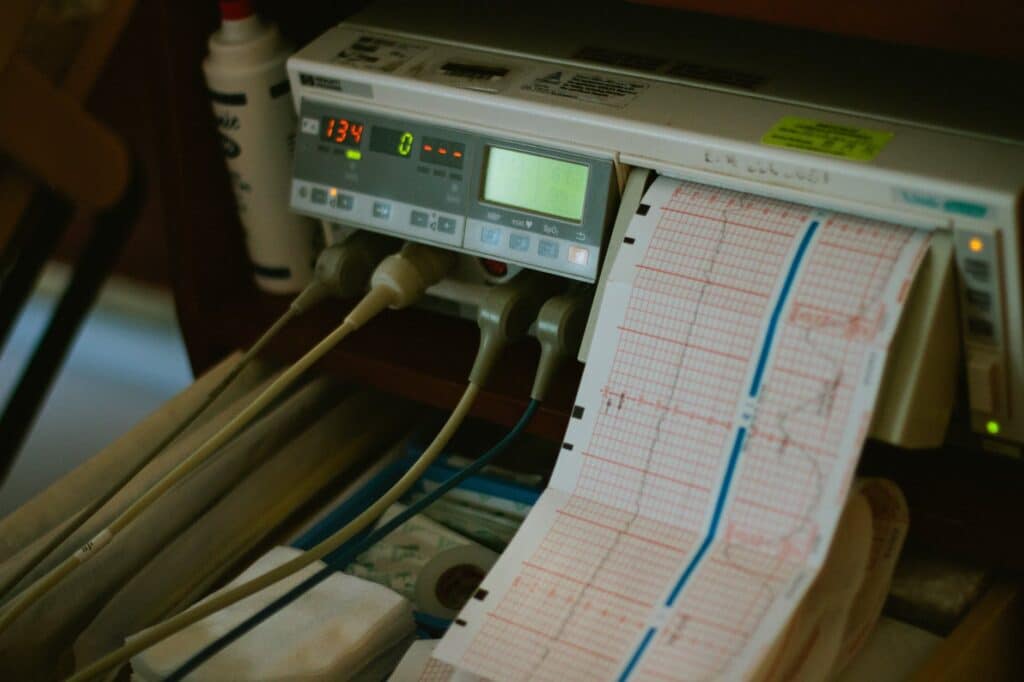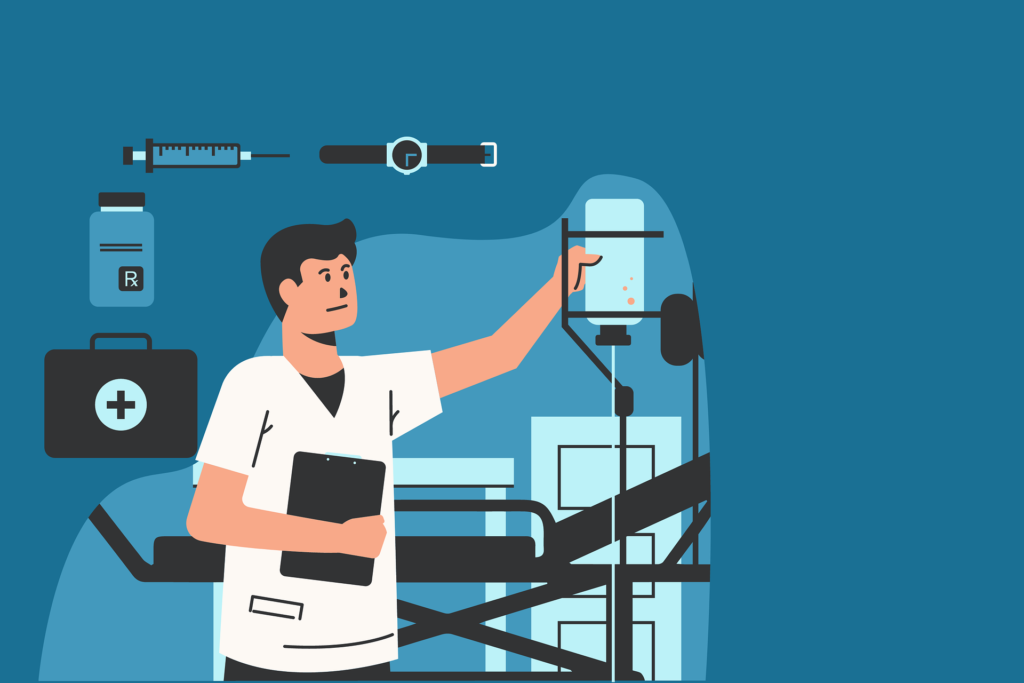Are you an EMT looking for a change of pace? Becoming an ER Technician is a great career choice that can be both challenging and rewarding. As an ER technician, you can use your current skillset but instead of being in an ambulance, you will work in an emergency room. Further, as an EMT you are already licensed and can apply to work as an ER tech with your current certification.
Emergency room technicians, also known as ER techs work in hospitals and other healthcare settings to provide immediate medical attention to patients experiencing a wide range of acute injuries and illnesses.
As an ER tech, you’ll be responsible for a wide range of tasks, including taking vital signs, performing basic medical procedures, administering medications (such as Oxygen), performing blood draws, and assisting doctors and nurses in the treatment of patients.
You can check Indeed for ER Tech jobs in your area, but we encourage you to keep reading for a deep dive into what you can expect working in an emergency room versus in an Ambulance. If you are not yet a licensed EMT please check out our page on EMT Training to get started.
How does Working as an ER Tech Compare to Working as an EMT
The biggest difference between working in an emergency room versus working in an ambulance is the environment. In an ER you are inside your entire shift. You do not have to worry about working in bad weather, or if it is hot or cold outside.
The next change EMTs will notice is the pacing. Working in an ER is a higher pace than in an Ambulance. You will often take care of multiple patients instead of just one. Some of these patients you will care for during your entire shift as opposed to caring for them during transportation to the hospital.
EMTs will also be trained on procedures that are typically beyond their scope such as administering IVs, performing blood draws, and running 12 lead EKGs on suspected cardiac patients.
As we continue this article we will explore the roles and responsibilities of an ER tech. We will also talk about the new skills you will learn and how much pay an ER tech makes compared to an EMT (hint: it’s higher).
Emergency Room Technician Duties and Responsibilities
As an emergency room technician, you’ll be responsible for a variety of duties, including:
- Assessing patients: You’ll be responsible for conducting a quick but thorough assessment of patients upon arrival in the emergency room, taking note of their vital signs. These vital signs usually include blood pressure, pulse, temperature, and respiratory rate. You also need to form a general impression of the patient’s condition.
- Providing basic medical care: ER Techs are trained to perform a variety of basic medical procedures, such as administering medications, dressing wounds, and performing basic laboratory tests. Another common task for ER Techs is to perform 12 lead EKGs
- Communicating with patients and families: Patients and their families will ask you questions about their condition and you may need to explain procedures and treatments and answer any questions they may have.
- Assisting doctors and nurses: ER Techs work closely with doctors and nurses to assist with more complex medical procedures, such as intubation or performing X-rays.
- Documenting patient care: You will be responsible for accurately documenting all patient care activities, including assessments, treatments, and medications.
- Maintaining equipment: You’ll be responsible for ensuring that all equipment in the emergency room is properly maintained and sterilized, such as monitors and blood pressure machines.
- Responding to emergencies: You’ll need to be able to remain calm and focused in stressful situations, like a trauma emergency or cardiac arrest.
Your Typical Day as an Emergency Room Technician
As an emergency room technician, your days will be varied and fast-paced. You’ll start your shift by checking in with the charge nurse and getting an update on any patients who were admitted overnight.
Depending on your assignment for the day, your first task will likely be to assess any new patients who have come into the emergency room. This will involve taking their vital signs and asking them about their symptoms. You will also be expected to help with medication administration and dressing of wounds.
If you are already an EMT and are reading this think back to your clinical rotations in the hospital. The tasks you performed during those days are a good indication of the tasks you will be expected to perform throughout your work day.
You’ll also be responsible for documenting all patient care activities. This can include assessments, treatments, and medication administration. In addition, you will be responsible for maintaining equipment in the emergency room, ensuring that it is properly cleaned, sterilized, in good working order, and ready for the next patient.
Preparing the room for a new patient must also be done quickly. There will be times when a patient will be assigned to a room you have not cleaned yet and you will have to put aside your current task and prepare the room for the arriving patient.
Working in an ER can be fast-paced, especially if you work in a major metropolitan area. You will be expected to perform your tasks as quickly and accurately as possible.
The work in the emergency room can be physically and emotionally demanding. At the end of your shift, you will debrief with the charge nurse, provide a handoff report to your replacement and complete any necessary paperwork before clocking out and heading home.
ER Tech Hours
Emergency room technicians typically work full-time hours, which can include evening, overnight, weekend, and holiday shifts. Some ER techs work on an on-call basis, which means that they may be called into work at any time if there is a need for additional staff in the emergency room.
ER techs typically work in hospitals, but they may also work in other healthcare settings, such as urgent care clinics. The hours for ER techs may vary depending on the specific location and type of healthcare facility they are working in.
ER techs may work long and irregular hours, as the emergency room is open 24/7 and patients can arrive at any time. It is typical to work 10, 12, or even 24-hour shifts as an ER tech. It’s important to be flexible and able to adapt to changing schedules and unexpected changes in workload.
Emergency Room Technician Training and Requirements
How to Become an ER Tech
To become an emergency room technician, you’ll need to meet certain requirements set by your state and employer. A high school diploma or equivalent is usually required, and you’ll also need to complete a formal education and training program in emergency medical care.
These programs are usually offered at community colleges and specialized training centers. Classes can take about a year or less to complete. After you complete training, you’ll need to pass a certification exam to become a licensed emergency room technician. Each state has different licensing requirements.
The good news is that if you are already licensed as an EMT then you are able to work in a hospital’s ER.
In addition to these requirements, you’ll also need to be physically fit and able to lift and move patients, as well as stand for long periods of time. Good communication skills are also important, as you’ll be interacting with patients, families, and other healthcare professionals on a daily basis.
You’ll need to be able to work well as part of a team, as the emergency room can be a fast-paced and unpredictable environment. Finally, it’s important to be adaptable and able to remain calm under pressure.
What is an ER Technician Trained On

As an EMT you will already possess a myriad of skills that translate well into the ER. However, there are some skills you will have to learn on the job. Some common new skills that you will learn are:
- IVs: ED tech typically learns how to place IVs. This is hospital-dependent. However, more healthcare facilities are training their ER techs on this skill. Almost every patient admitted to an ER requires an IV.
- Performing blood draws: Along with IVs, ER technicians are usually required to perform blood draws for lab analysis. Typically you will do this after you place the IV.
- EKGs: You will be trained on how to perform an EKG and how to hook a patient up to a cardiac monitor. While your job doesn’t include interpreting the EKG results, your help is invaluable in speeding along patients that are having a suspected cardiac.
EMT to ER Tech Transition
EMTs already possess most of the skills required to be ER techs. A large amount of an EMT’s pre-hospital experience also translates well.
How do your Skills as an EMT Translate Into Working in an Emergency Room
As an emergency medical technician (EMT), you’ll have developed a range of skills and knowledge that can be useful in working as an emergency room technician (ER tech). Here are some ways that your skills as an EMT may translate into working in an emergency room:
- Patient assessment and treatment: As an EMT, you’ll have experience assessing patients and providing appropriate treatment based on their symptoms and conditions. This can include administering medications, dressing wounds, and performing basic assessment tests such as stroke exam. These skills are also useful for an ER tech, who is responsible for quickly assessing patients upon arrival in the emergency room and providing appropriate treatment.
- Communication skills: EMTs must be able to communicate effectively with patients, families, and other healthcare professionals. This includes being able to explain procedures and treatments and answer questions in a clear and compassionate manner. As an ER tech, you’ll also need to have strong communication skills to interact with patients and other healthcare team members.
- Teamwork: As an EMT, you’ll have experience working as part of a healthcare team, collaborating with doctors, nurses, and other professionals to provide the best possible care to patients. This teamwork experience is valuable in an ER setting, where you’ll be working closely with other healthcare professionals to treat patients.
- Safety and infection control: As an EMT, you’ll have learned about safety protocols and proper infection control procedures to reduce the risk of injury and infection. These skills are also important for an ER tech. ER technicians must follow safety protocols and infection control procedures to ensure a clean and safe environment for patients and themselves.
Emergency Room Technician Salary

The salary for an emergency room technician can vary based on a number of factors, including the individual’s level of education and experience, the location of the job, and the specific employer. According to the U.S. Bureau of Labor Statistics (BLS), the median annual wage for ER techs was $35,400 as of May 2020.
A Comparison Between EMT and ER Tech Salaries
ER techs tend to make more money per hour. According to Salery.com, the average wage for an ER tech is $20 per hour, while the wage for an EMT Basic averages $17 per hour. It is plausible to work a few years on the road as an EMT and then find a hospital willing to pay you more per hour to come work for them.
A big advantage of working for a hospital is education. Many hospitals will pay for you to attend school to become a higher-level healthcare provider such as a Registered Nurse or Respiratory Therapist.
Highest Paying States for ER Techs
Here are the top 10 states that on average pay the highest ER Tech Salaries.
| State | Annual Salary | Monthly Pay | Weekly Pay | Hourly Wage |
|---|---|---|---|---|
| New York | $58,028 | $4,836 | $1,116 | $27.90 |
| New Hampshire | $54,839 | $4,570 | $1,055 | $26.37 |
| Vermont | $54,236 | $4,520 | $1,043 | $26.08 |
| Montana | $51,692 | $4,308 | $994 | $24.85 |
| Arizona | $51,231 | $4,269 | $985 | $24.63 |
| New Jersey | $51,099 | $4,258 | $983 | $24.57 |
| Massachusetts | $50,781 | $4,232 | $977 | $24.41 |
| Wyoming | $50,724 | $4,227 | $975 | $24.39 |
| Hawaii | $50,140 | $4,178 | $964 | $24.11 |
| Nevada | $49,979 | $4,165 | $961 | $24.03 |
Information provided by https://kiiky.com/
Conclusion
Becoming an EMT for many people is the first step in a medical career. Transitioning from the road to the hospital is a natural progression for those seeking to become an RN, MD, or Respiratory Therapist. Not only can you learn new skills, but on average you can earn higher wages. Many ERs also employ Paramedics.
Becoming an ER tech is an easy transition for an EMT. You already possess a medical license and the skill that emergency rooms find valuable. EMTs are no longer relegated to an ambulance, becoming an ER tech could be a great career move for you.


